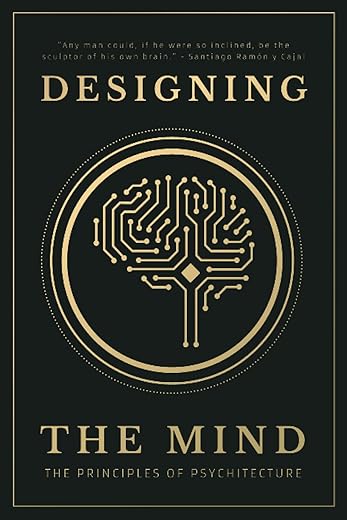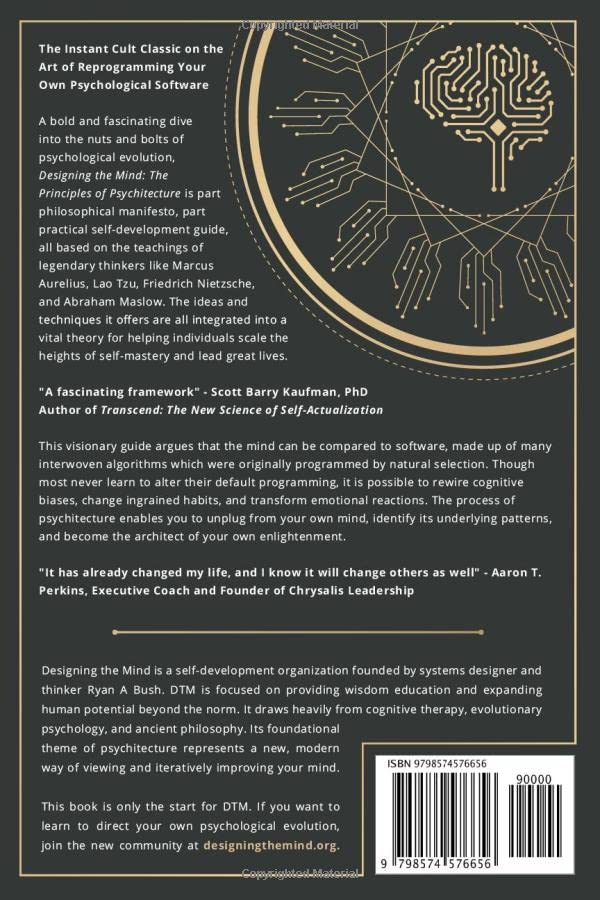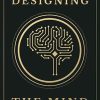Designing the Mind: The Principles of Psychitecture
£15.60
A bold and fascinating dive into the nuts and bolts of psychological evolution, Designing the Mind: The Principles of Psychitecture is part philosophical manifesto, part practical self-development guide, all based on the teachings of legendary thinkers like Marcus Aurelius, Lao Tzu, Friedrich Nietzsche, and Abraham Maslow. The ideas and techniques it offers are all integrated into a vital theory for helping individuals scale the heights of self-mastery and lead great lives.
“A fascinating framework” – Scott Barry Kaufman, PhD, author of Transcend: The New Science of Self-Actualization
This visionary guide argues that the mind can be compared to software, made up of many interwoven algorithms which were originally programmed by natural selection. Though most never learn to alter their default programming, it is possible to rewire cognitive biases, change ingrained habits, and transform emotional reactions. The process of psychitecture enables you to unplug from your own mind, identify its underlying patterns, and become the architect of your own enlightenment.
“It has already changed my life, and I know it will change others as well” – Aaron T. Perkins, Executive Leadership Coach
Simultaneously ancient and futuristic, Designing the Mind defies categorization, masterfully linking mindfulness to transhumanism, evolutionary psychology to Stoicism, and neuroscience to Buddhism. It frames the ideas of ancient sages as open-source code for the mind, putting forth a new, rational vision of spiritual enlightenment centered around gradual self-optimization.
“Super intriguing” – Jason Silva, global keynote speaker and Emmy-nominated host of Brain Games
This book will teach you to cultivate deep introspective insight. It will show you how to effortlessly change your automatic behaviors and manipulate your own desires so you always get what you want. It will provide a toolkit for building perpetual peace into your operating system. If you have ever longed for an operating manual for your own mind, this book will serve as a crucial guide for turning your own mind into a palace.
Read more
Additional information
| Publisher | Independently published (10 Jan. 2021) |
|---|---|
| Language | English |
| Paperback | 268 pages |
| ISBN-13 | 979-8574576656 |
| Dimensions | 15.24 x 1.55 x 22.86 cm |





by Rooney
“Designing the Mind: The Principles of Psychitecture” offers a captivating journey into the realm of psychitecture, a concept that melds psychology and architecture to explore how our physical environments profoundly impact our mental well-being. Authored by a practitioner in the field, this book introduces readers to a unique and thought-provoking perspective on the intersection of design and psychology.
The standout feature of this book is its innovative approach to understanding the relationship between the spaces we inhabit and our cognitive and emotional experiences. It takes the reader beyond the aesthetics of architecture and delves into the profound ways in which our surroundings influence our thoughts, emotions, and behaviors.
The author skillfully weaves together psychological principles and architectural concepts, offering a cohesive framework for understanding how design choices can enhance or hinder our mental states. Whether you’re an architect, designer, psychologist, or simply someone interested in the impact of your environment on your mind, this book provides valuable insights.
The writing style is engaging and accessible, making complex ideas and theories approachable to a broad audience. The author’s passion for the subject shines through, and real-world examples and case studies illustrate the principles effectively.
The book encourages readers to become more mindful of their physical surroundings and consider how design choices in homes, offices, and public spaces can promote well-being and productivity. It prompts reflection on our own environments and how they might be optimized to support our mental health.
One minor consideration is that some readers may find the depth of content in certain sections to be quite detailed, especially if they are approaching the subject from a non-technical background. However, this depth also ensures that the book provides a comprehensive exploration of the topic.
by James84
It is written in an easy to read and understand way.
by Amazon Customer
This really is a great book.
This is not “pop” self-help book. Although, it does seek to be useful (rather than purely academic), since it aims to gives the reader tools for self-improvement.
This is not a psychology book. Because, although it uses ideas and models from psychology e.g. CBT, it is rooted far more in philosophy than in psychology.
It is not a philosophy book. Because it is not a guide to living the “good life”, since it takes it cues from psychology to orientate toward a system of thinking.
In this sense, it is an excellent synthesis of quite disconnects fields.
I absolutely loved the philosophy, and agreed with almost every word. However, because so much of it chimed with my own way of thinking and my own philosophy, I maybe didn’t get as much from it as someone else might. But, I suspect anyone who doesn’t regularly perform deep self-analysis, assessing how they think, and live inauthentically, would benefit greatly from such an amazing read.
Utterly brilliant!
by Cari Mayhew
I’m so glad this book came up in my personal recommendations on Amazon – I’m kinda a connoisseur when it come to personal development books, and this book has earned s pot as one of my personal favorites.
Not only is the philosophy of the book on point, but there’s also a lot of practical guidance in there too. I also liked how concisely all the content was delivered, there was no fluff whatsoever. I also liked the use of quotations from philosophers and thinkers, very eloquent.
And it was incredibly thoroughly referenced – in some passages nearly every sentence was backed up by a note in the back of the book.
I look forward to re-reading the whole the thing again in the future. And in the meantime, I’ll be referring to the free toolkit you get a link to!
by Zen
Having read many books over the years covering a wide range of subjects enquiring into the human mind and condition and more so my own, I thought I had a fairly unique and congruent perception of how we function.
I’ve read books from Buddhist, Taoist, Psychological and various spiritual and metaphysical perceptions.
I don’t normally review books, but felt compelled to do so as this is a gem of a book.
It’s a fusion of ancient wisdom and modern thinking. Drawing on thinkers from the ancient and recent past who have all enquired into the nature of our minds and being.
From someone who has an understanding of cbt ( cognitive behavioural therapy) and the brain and mind to a degree I found this book confirming of what I have read and experienced myself.
The book reads well, but takes reflection and level of rumination, but is accessible and rewarding.
It breaks down how our thoughts and habits can arise and puts them into diagrams (algorithms) that help you picture your thoughts and responses to stimuli.
The author is extremely well read and knowledgeable and seems to have a real dynamic understanding and passion for the subject he is covering and presenting.
If you too like ancient wisdom, but are also modern minded this is a must read.
by Toby Lawson
A fascinating exploration of the mind combining wisdom from throughout the ages with technical precision and creative visualizations.
This book guides you through the complexities of the mind with very clear explanations of how we work – why we think what we think, and feel what we feel. The writing is on point, never rambling, with a very accessible enjoyable to read style, using effective visuals, well chosen quotes and helpful examples.
This book is making a positive contribution and impact on my own journey in philosophy, stoicism, mindfulness and personal growth. So I would say it is essential reading for anyone who is looking to grow and understand themselves better, but at the same time a benefit to absolutely anyone who would choose to give it a go.